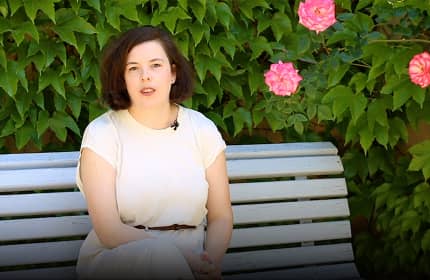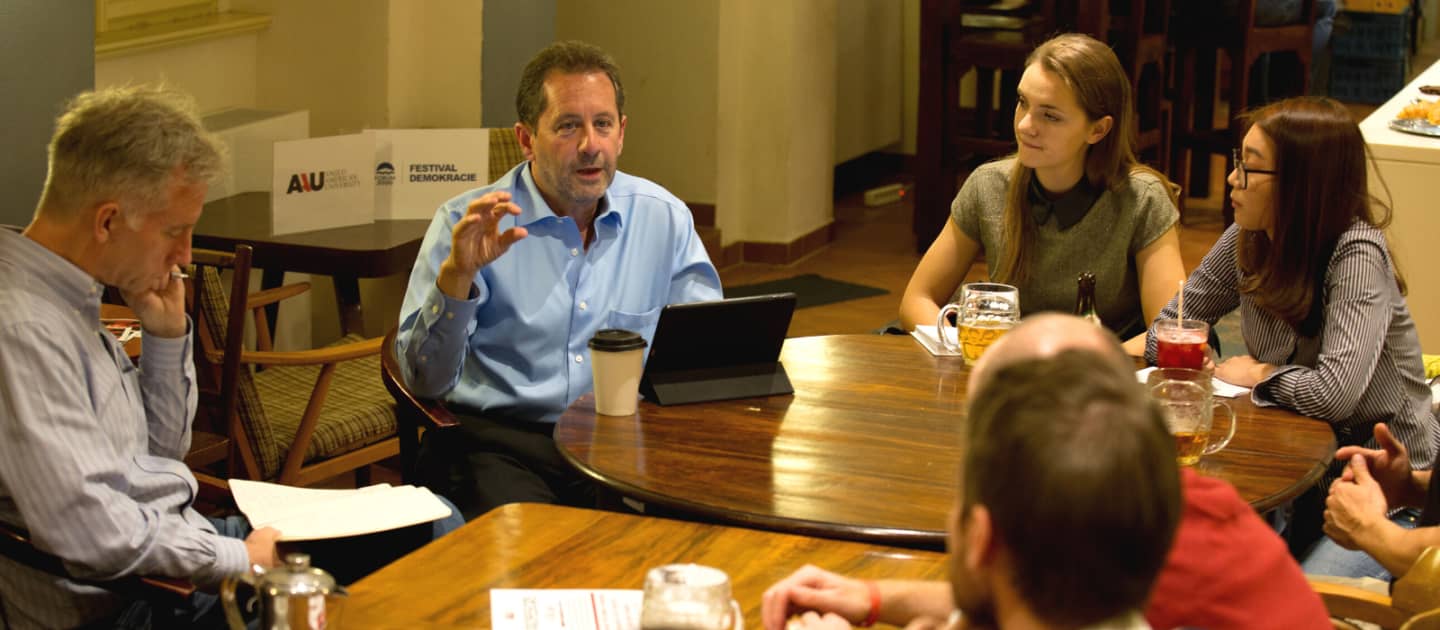
Political Science: Conflict and Democracy Studies
The B.A. in Political Science: Conflict and Democracy Studies program at Anglo-American University is taught by faculty that received training from European, British, and American institutions – bringing many years of dynamic professional experience to the classroom.

| Accreditation | WASC + NABHE |
| Degree | Bachelor of Arts |
| Duration | 3 years |
| Location | Prague, CZ |
| Tuition EU | CZK 654 000 |
| Tuition NON-EU | CZK 764 700 |
| Intake | Fall / Spring |
| Deadline | Rolling Admission |

Download Brochure
Please submit your details in order to receive the brochure via email.
About the program
This program instructs students through a range of comparative approaches to the study of conflict outcomes and democratic systems of governance. It specifically instructs students on the nature of different forms of conflict including conflict between states, within states, and sub-national conflict.
Students will learn about the determinants of conflict onset, duration, and resolution. Likewise, they will study the different strategies of collective action that can be observed in contexts featuring both nonviolent dissent and political violence (including civil war and stages of radicalization), along with how these strategic processes influence empirical trends of democratization.
The Conflict and Democracy Studies concentration draws from scientific literature found in top political science and international relations journals to teach students about the most recent theoretical and empirical trends on democratic backsliding, individual and group based forms of radicalization, and humanitarian intervention, including conflict resolution. Together, these topics will provide students with a thorough overview of the interplay between democratic institutions and conflict.
Upon completion, our students will acquire an ability to develop logically coherent arguments on conflict and democracy; synthesize different literatures pertaining to specific research questions and outcomes; draw on popularly used data sets to inform their qualitative assessment of single or multi-country cases; understand the trends inherent to the outbreak and duration of different forms of conflict.

Beyond the classroom you can join student clubs like Diplomacy or Model UN, practice your debate skills at a faculty-student debate or discuss current political issues with professors and local experts at an event like ‘Professors in the Pub’.
AAU’s Career Center also connects students with numerous professional internships in the Czech Republic and abroad every year.
Veronika Bartáková, IR student, President of Diplomatic Club“AAU makes networking incredibly easy to do. I was able to participate in various events that don’t necessarily connect to my coursework—conferences, literature festivals, debates, lectures, etc. AAU has helped me and my club get in touch with event-organisers, which, for example, allowed us to host an event during the Festival of Democracy organised by the famous Forum 2000 conference.”
As of January 2021 AAU is a Member of the European Consortium for Political Research. ECPR is the leading scholarly society for political scientists in Europe with over 300 institutional members in nearly 50 countries. This will allow AAU students and faculty to participate in ECPR events and become members of some of its standing groups.
Program Structure
Political Science: Conflict and Democracy Studies is a 3-year study program. To graduate, students must accumulate 90 US credits (180 ECTS credits) by completing 30 courses.
For more information on the modular structure and the study program, please contact our admissions team at admissions@aauni.edu.
Learning Outcomes
Graduates of the B.A. in Political Science: Conflict and Democracy Studies can expect to:
- Successfully differentiate between different conflict processes.
- Understand the trends and correlations associated with democracy and conflict.
- Explain why some types of countries are likelier than others to experience civil war.
- Explain the evolution of United Nations peace keeping operations (PKOs).
- Differentiate between varying cleavages of ethnic and religious motivations in conflict.
- Understand the types of political, judicial, and economic constraints that democratic institutions present political actors in conflict settings.
Career Prospects
AAU graduates thrive in multinational environments and are able to communicate professionally in English to international audiences. As a graduate of this degree program, you will be well equipped to continue your studies or pursue a global career in areas such as:
- Governmental, Foreign Affairs Institutions
- International Organizations
- Think Tanks
- Humanitarian Government or NGO’s
- Pursuing of Advanced/Postgraduate Degree
Qualification Awarded
The Bachelor’s degree awarded is concurrently recognized as a Bachelor of Arts (B.A.) in the United States, per AAU’s accreditation by the WASC Senior College and University Commission, and as a Bakalář (Bc.) in the Czech Republic, per AAU’s accreditation by the National Accreditation Bureau for Higher Education (NABHE). Graduates may select whether to use the U.S. post-nominal or the Czech pre-nominal title.
This concentration is accredited by the National Accrediting Bureau for Higher Education. Its completion will be indicated on the transcript, diploma, and diploma supplement.
Financial Aid and Scholarships
We provide a wide range of scholarships, tuition discounts, and financial aid options to help make quality education more accessible. To learn more please visit our dedicated Financial Aid and Scholarships page.
Additional information
- Learn more about tuition.
- Learn more about undergraduate admission requirements.
- Explore our FAQ section.
- Should you have any further questions please email us at admissions@aauni.edu.
See what our students have to say
I enjoy classes at AAU, especially political philosophy because it is teaching me how to communicate in social communities and this skill could be used both in daily life and in business. Plus, our professor is amazing. I’ve never seen such a charismatic and interesting person who dives fully into the subject of every lesson.

International Relations, Kazakhstan
AAU makes networking incredibly easy to do. I was able to participate in various events that don't necessarily connect to my coursework like conferences, literature festivals, debates, lectures, etc. When I was President of the Diplomatic Club, AAU helped me get in touch with event-organizers, which, for example, allowed us to host an event during the Festival of Democracy organized by the famous Forum 2000 conference.

International Relations, Czech Republic
Meet the people


Ing. Zuzana Bréhéret
Vice Dean, Lecturer zuzana.breheret@aauni.edu
Doc. Pelin Ayan Musil, PhD
Senior Lecturer pelin.ayan@aauni.eduDo you have questions?
We are happy to help!
Ask us a question!


